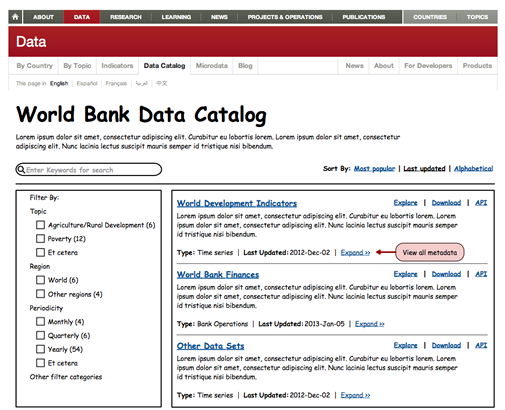The Future of the Open Data Catalog
 |
| This is a wifreframe from the World Bank showing a search interface for their highly respected data catalog. |
Searchable Data Sets?
Check out the #wireframe for a fully searchable data catalog. This is where #opendata needs to head. Citizens do not browse data like kids in a candy store. I have asked about engagement and watched them interact with open data sets and not one non-data geek ever found them interesting. For methodology I chose sets of sets of 3-5 people and just asked them questions and sent them links. These people came from my Facebook groups of friends and do not have a professional connection with me.
When I asked them about their browsing patters in general most people used Google Search to find specific information or started with a list of 10 or less "go to" sites.
Data sets need to be searchable and queries need to come from Google and index both the data sets themselves and be able to interpret natural language queries before will be mainstream and of interest to the general public.
The World Bank Blog
What the World Bank is Proposing
Fully searchable. The new data catalog will be fully searchable, both through full text search (like conventional search engines) and faceted search. That allows users to find datasets much more quickly, and filter results by categories such as data type, format, or coverage.
Federated. The current data catalog includes many different World Bank open data catalogs, such as Finances and Projects, but not the data sets they contain. The new data catalog will allow you to search multiple World Bank open data catalogs from a single location.
User friendly. We are looking at making several improvements to the catalog’s user interface to make it easier to read and navigate, with improvements such as sortable columns and shortcuts to data query tools.
Better metadata. More comprehensive and easier to read metadata, including a data catalog API and support for multiple languages, which will be phased in over time.
Expandable and scalable. Support for additional data types, larger datasets, and greater numbers of datasets.


Comments
Post a Comment